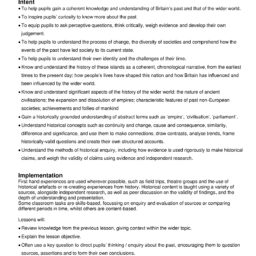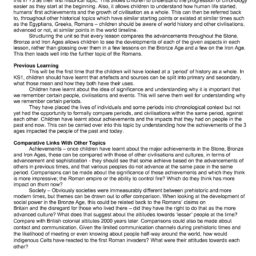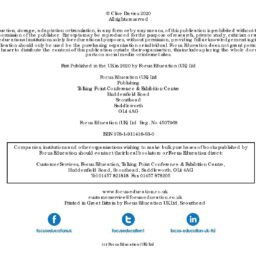Town End Juniors
 |
History-Policy-23-24.pdf
History Policy 23-24.pdf application/pdfHistory Policy 23-24.pdf Open Download Copy Link 137.12 KB 2023-10-04 4 October 2023 2023-10-04 4 October 2023 |
 |
History-Scheme-Of-Work-V1_1.pdf
History Scheme Of Work application/pdfHistory Scheme Of Work Open Download Copy Link 375.1 KB 2023-09-21 21 September 2023 2023-09-21 21 September 2023 |
 |
The-Blocked-Curriculum-History-23-24.pdf
The Blocked Curriculum - History 23-24.pdf application/pdfThe Blocked Curriculum - History 23-24.pdf Open Download Copy Link 5.6 MB 2023-10-04 4 October 2023 2023-10-04 4 October 2023 |
3
We believe that the study of History is more than simply facts and dates – our pupils are encouraged to delve into the past in a much deeper way. Pupils learn History mainly through a topic-based approach, utilising a wide range of enquiry skills, sources, experiences and artefacts to bring the past to life, building upon skills from KS1.
History allows our children to compare different periods in time, to examine how and why things have changed, and expand their independent enquiry skills. We teach children to be open minded and questioning thinkers who understand the cause and effect of historical change. We want them to understand how people have lived in the past and compare this to modern life.
We encourage first-hand experiences through comparing real artefacts and wherever possible arranging field work visits to relevant sites of historical interest in the region or bringing in specialists. Enrichment activities include themed days in school, visiting speakers or theatre groups, day visits and residential field trips. Trips have included Creswell Crags, Chatsworth House, Hardwick Hall, Eden Camp WWII Museum, Jorvik Viking Centre, Lea Green and Matlock Bath Mining Museum.
Intent
- To help pupils gain a coherent knowledge and understanding of Britain’s past and that of the wider world.
- To inspire pupils’ curiosity to know more about the past.
- To equip pupils to ask perceptive questions, think critically, weigh evidence and develop their own judgement.
- To help pupils to understand the process of change, the diversity of societies and comprehend how the events of the past have led society to its current state.
- To help pupils to understand their own identity and the challenges of their time.
- Know and understand the history of these islands as a coherent, chronological narrative, from the earliest times to the present day: how people’s lives have shaped this nation and how Britain has influenced and been influenced by the wider world.
- Know and understand significant aspects of the history of the wider world: the nature of ancient civilisations; the expansion and dissolution of empires; characteristic features of past non-European societies; achievements and follies of humankind
- Gain a historically grounded understanding of abstract terms such as ‘empire’, ‘civilisation’, ‘parliament’.
- Understand historical concepts such as continuity and change, cause and consequence, similarity, difference and significance, and use them to make connections, draw contrasts, analyse trends, frame historically-valid questions and create their own structured accounts.
- Understand the methods of historical enquiry, including how evidence is used rigorously to make historical claims, and weigh the validity of claims using evidence and independent research.
Implementation
First hand experiences are used wherever possible, such as field trips, theatre groups and the use of historical artefacts or re-creating experiences from history. Historical content is taught using a variety of sources, alongside independent research, as well as peer discussion on the validity of findings, and the depth of understanding and presentation.
Some classroom tasks are skills-based, focussing on enquiry and evaluation of sources or comparing different periods in time, whilst others are content-based.
Lessons will:
- Review knowledge from the previous lesson, giving context within the wider topic.
- Explain the lesson objective.
- Often use a key question to direct pupils’ thinking / enquiry about the past, encouraging them to question sources, assertions and to form their own conclusions.
- Set common tasks which are open-ended and can have a variety of responses, using classroom assistants to support children individually or in groups.
- Vary the resources and activities to suit different learning styles, working individually, in pairs or groups, ensuring they can be effective in finding out about and trying to explain the past.
- Impact
Children build upon their skills progressively as they move through the school, becoming independent in the skill of historical enquiry. History allows children to explain the ‘how’ and ‘why’ of History by comparing themes across different historical periods. Pupils learn to be curious and independent investigators, who understand changes in society over time, and can explain both the reasons for this, and the impact on later times and cultures. Children are able to present their hypotheses based on this and discuss the validity of ideas and sources. Teachers’ planning, teaching and AFL addresses the engagement and accessibility of PP groups and SEND pupils, so that they are able to access the curriculum effectively at their level of attainment.